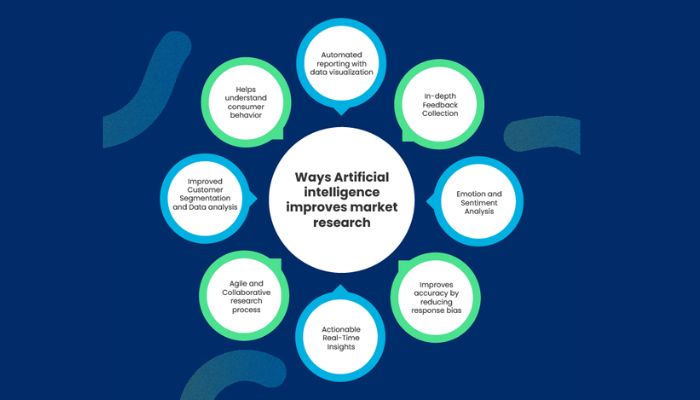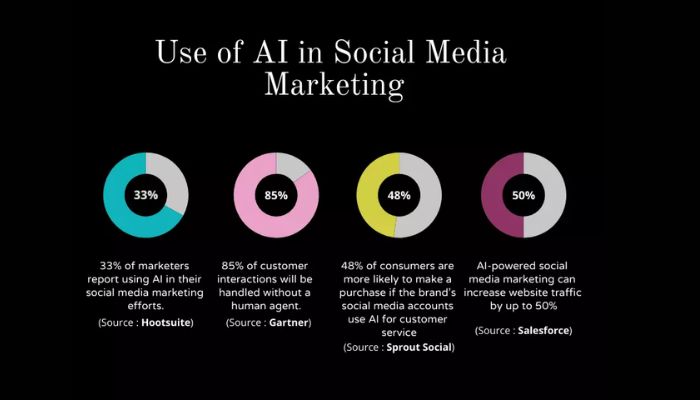The past decade has seen a massive surge in Artificial Intelligence (AI) adoption and integration into virtually all industries, transforming how businesses work and respond to the changing needs of their markets.
Nowhere is this truer than in marketing where rising competition demands cutting-edge personalization—driven by data analysis. In light of that trend, it’s critical for marketers, entrepreneurs, and anyone else to keep abreast of AI-driven changes; from predictive analytics to chatbots and ethically responsible campaigns.
Understanding these techniques not only helps with surviving the industry storms but also propels any product or marketing endeavor forward in an ever more teeming marketplace.
For beginners in digital marketing and SEO, this blog will explore some major shifts that are revolutionizing modern marketing through AI solutions and tools, along with practical advice on leveraging and optimizing more AI-centric workflows in B2C and B2B settings.
This, together with ethical considerations about the responsible use of AI techniques and best approaches for marketers make it possible to not be just one among many but rather a pioneer leading the charge.
AI-Powered Customer Insights
Utilizing AI to analyze consumer data and behavior
Utilizing AI to analyze consumer data and behavior presents unprecedented opportunities in marketing. By applying automated technologies, marketers can acquire a wealth of insights quickly from customer data to test their campaigns, personalize offerings at scale, and better understand customer preferences.
AI-power analytics solutions also enable smart segmentation that goes beyond basic demographics in tailoring really relevant messages for consumers with more accuracy.
With the help of predictive analysis algorithms, businesses will be able to create highly targeted emails that lead customers all the way down the sales funnel towards conversions much faster than traditional methods.
Personalization at scale: Tailoring marketing campaigns with AI-driven insights
Personalizing marketing campaigns for an industry-scale audience has become much easier with the power of AI. By leveraging AI-generated insights into customer preferences and behavior, marketers can deliver highly targeted messages that increase engagement and drive conversions.
With customizable account segments, tailored product experiences based on data points like age or purchase history, plus real-time content optimization using predictive analytics models – all powered by AI – marketers are able to enact meaningful one-on-one conversations with each customer at scale.
How to leverage AI to understand customer preferences better
Utilizing AI to understand customer preferences requires distilling vast amounts of data, such as purchase history or websites clicks, into meaningful patterns. Companies must know their customers’ interests and they can turn into personalization attributes for segmentation. With predictive modeling on top of these segmentations, businesses can fine-tune messaging to optimize sales effectiveness.
AI algorithms, such as Natural Language Processing (NLP) and pattern recognition tools can evaluate large pools of behavioral data quickly so companies are better able to identify changing customer trends in order to determine what customers truly want or need. Leveraging AI-augmented customer insights enables businesses to create highly relevant forms of marketing communication that lead customers down a successful path toward conversion.
Chatbots and Virtual Assistants
The rise of AI-driven chatbots and virtual assistants in customer interactions
The incorporation of AI-driven chatbots and virtual assistants into customer interactions is becoming increasingly commonplace. This allows brands to provide an enhanced customer service experience with faster response times, better accuracy, and higher-quality solutions.
With AI technology enabling human-like conversations at any time day or night, companies can access valuable data about customer complaints or queries fast—and automate their responses in a way that cultivates an even deeper relationship between the brand and their customers.
Enhancing customer service and support with AI-powered solutions
Chatbots and virtual assistants are AI-driven tools that are changing the way companies approach customer care. For example, features like natural language processing (NLP) enable simulated conversations between humans and machines to provide automated customer service. AI also Personalization at scale by tailoring answers to customers according to their journey or profile.
By creating user classes with machine learning models, messages and relevant content can be offered and curated across different channels such as emails, text messages, or posts on social media platforms. Such AI capabilities help enhance customer service ad support both in terms of personal touch and productivity gains for marketers managing large portfolios simultaneously.
Social Media and Influencer Marketing
AI’s impact on social media marketing
AI is revolutionizing the way social media marketing works. AI enables marketers to more accurately target audiences and infuse optimized personalization in messaging. Additionally, it helps identify suitable influencers or opinion leaders more quickly and measure campaign success with greatly reduced effort.
Machine learning gives insight into consumer response patterns and dynamic ad placement, along with content optimization enabled by Natural Language Processing frameworks. Thus empowering marketers to leverage advanced predictive capabilities for truly powerful campaigns on digital platforms like never before.
Leveraging AI to identify suitable influencers and measure campaign success
AI-driven insights enable brands to identify potential influencers more accurately and evaluate their suitability for a campaign.
Leveraging algorithms, predictive analytics, and natural language processing (NLP) solutions can help marketers uncover data about an influencer’s social activities KPIs, demographics, followers’ loyalty ratings, interests and influence stats across different platforms.
With AI systems in place for selecting an influencer based on understanding the preferences of a targeted audience segment along with measuring campaign success intelligently is now achievable.
Programmatic Advertising
Transformation of advertising through programmatic AI
Programmatic advertising is a key part of the AI revolution in marketing, transforming traditional approaches to digital ad placement and budget optimization. Utilizing AI algorithms and automated real-time bidding capabilities, it’s possible to deliver relevant ads to targeted audiences based on individual customer insights.
As such, programmatic advertising offers efficient ad campaign management with the optimal budget allocation capability to achieve maximum ROI for businesses integrating into their digital advertising strategies.
Advantages of AI-powered ad placements and real-time bidding
AI-powered programmatic advertising enables marketers to target more effectively and improves accuracy due to its ability to collect, analyze, and adjust data in real-time. This automated process not only makes delivering ads faster and much easier but can also provide insights into the live marketplace so advertisers gain an edge over manual placements and bidding models in terms of ROI.
AI specializes in effectively selecting ad sections or placements for publishing based on impressions, clicks, views, and cost savings for each campaign involved within specific networks that performed better than all others.
Additionally, often using a combination of platforms to fulfill goals provides an opportunity for even greater success with AI playing a role in maximizing return from investment used effectively.
Embracing AI in Marketing: Best Practices
Cultivating a culture of innovation and continuous learning
Having a culture of innovation and continuous learning is essential in successfully incorporating Artificial Intelligence (AI) into modern marketing strategies. Adapting to rapid advances in AI solutions starts by creating an internal environment that encourages creativity, collaboration, experimentation, and idea sharing.
Continuous team training seminars should be set up so members can stay abreast of the latest trends and updates in AI technology. Collectively discussing improvements in the process can cultivate an attitude of acceptance of disruptive changes more positively.
With changes being accelerated by automation techs like AI and Machine Learning (ML), employees must continuously challenge the “best practice methods”, train relevant skills, encourage a collaborative spirit between all teams in order to keep up with these advancements for maximum access possible.
Identifying opportunities for AI integration into marketing workflows
To ensure success with AI integration, opportunities to use AI in marketing workflows need to be clearly identified. It’s important organizations take an audit of their existing processes and look for areas ripe for improvement. Leverage analytics tools and feedback from customers to clarify the intricate relationships marketers manage every day so that enough context exists around customer behaviors.
Use this diligence of data across team communication channels in combination with accessible market intelligence that can guide strategic decisions concerning product roadmaps, and creative strategies early on for better downstream performance optimization.
All these looking ahead initiatives mark opportunities where direct productivity and fidelity associated loops are easier for machine learning algorithms to comprehend intuitively providing efficient goal-driven automation results.
Collaborating with AI technology providers and staying updated with industry trends
In order to maximize the potential of AI in marketing and remain competitive, marketers must stay up-to-date with industry trends. Collaborating with experienced AI technology providers can give teams an edge in entering utilize existing technologies more efficiently, creating new systems of their own development or employing alternative models.
Working together helps garner market insights, take advantage of team-building exercises, and bring unique perspectives to the table which can help uncover unorthodox methods that could enhance long-term success.
Procedures for checking data accuracy also help ensure campaigns meet essential objectives as efficacy is key for successful utilization of specialized enterprise applications within a lower cost envelope — all enable robust growth due to properly implemented algorithms undertaking predictive analysis and automation process too.
Conclusion
The AI revolution has dramatically transformed the marketing industry. AI is powering customer insights, content creation, personalization at scale, and immersive experiences.
Companies must adapt to take advantage of these opportunities by creating an integrative approach incorporating intelligence from data-based technologies but it was also important for marketers not to forget that their jobs are largely about building relationships with customers -another aspect inherently powered by humans.
By applying the discussed best practices, forward-thinking organizations can leverage advanced technology while ensuring authenticity through personality in their directing efforts whereby the experiences consumers stay connected with brands in unexpected ways over time.





















